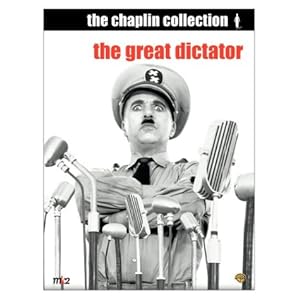
It wasn't easy finding this one. There's something very off about the opening of The Great Dictator, and it took me a few minutes to figure out. If you don't know, it's Charlie Chaplin's first full sound film, and it mocks Hitler and the Nazi party. It starts off with Chaplin playing a soldier in a battle during World War I, fighting for the fictional Tomainian side, which takes the place of Germany in the movie. It's all pretty typical Chaplin gags, but something is just wrong. And then I noticed - though there are plenty of sound effects going on, and even a few lines from Chaplin himself, there's no music. Silent movies just seem wrong without music constantly playing in the background, and it makes the whole opening seem weird. The scene ends with Chaplin and another soldier crashing a plane and him getting amnesia, which transitions the movie to the real story and fixes the issue, as it becomes more of a normal sound movie and brings back the soundtrack.
It's still a bit weird though, a movie with the soul of a silent film playing with a sound film's toys. I wouldn't want it to have been silent though, because the funniest part of the movie is probably Chaplin's impression of Hitler. "Adenoid Hynkel" is the dictator of Tomainia, and though he speaks English in most normal scenes, whenever he's giving a speech or gets too angry, he starts speaking a German-sounding gibberish that matches Adolf's mannerisms without actually make a lick of sense. A few words familiar to English speakers will slip in, but otherwise it's all just vocal performance, much like the musical number from near the end of Modern Times. There's plenty of other stuff in the movie, as Chaplin bounces between the roles of evil dictator and a Jewish barber who at first doesn't quite understand why the police seem to hate him so much.
It also features his Modern Times costar and real-life wife Paulette Goddard as the requisite love interest and Jack Oakie as a stand-in for Mussolini, who he has some amusing back-and-forth with. Eventually the movie decides it should have a plot, and the barber and his friends make an attempt to get rid of their oppressive government from within. It ends with the barber giving a rousing speech, a complete triumph of orating that I wasn't really expecting from a man most famous for never speaking. The words are a bit over the top, but he means them, and it was an interesting way to end a mostly solid movie. It's not my favorite work by Chaplin, but it ended up being a lot better than the beginning led me to believe it might be.
Monday, January 31, 2011
The Great Dictator
Sunday, January 30, 2011
Network
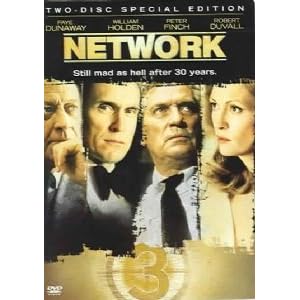
Sometimes it's a bit difficult to watch these older movies, where a single line can hang over its entire legacy, and leave you waiting for it to come while you're trying to enjoy the story. Network's mad as hell line earns that fame though, in one of the film's most memorable scenes out of many. What's even more remarkable about the movie though is how much what its central ideas are still seem familiar today. It came out 35 years ago, but what some of the characters say about the world being a business rather than a collection of nations and people is still being said today. It's kind of a scary thing to think about, and I had no idea people were already seeing things that way back then.
So Network is roughly equal parts drama and dark satire. Things start when a retiring news broadcaster at a dying network named Howard Beale declares one night that he will kill himself on air a week later. The executives try to quiet him up and get rid of him, until Faye Dunaway as a programming developer realizes the ratings potential of a "mad prophet" cursing and yelling at people on the air every night. They keep him around, shifting it from a news program to a variety show with a number of segments with Beale as the star, preaching wildly to a studio audience and 60 million viewers at home. It's a pretty ridiculous scenario, but it serves as a solid platform for a lot of black humor and well written, apocalyptic speeches.
The movie is a showcase of talent as much as anything made in a long time, getting nominated for and winning a ton of awards, including five performances nominated for acting Oscars, three winning. Beatrice Straight's supporting actress win makes it the briefest role to ever win such an award, making me think it was kind of a light category that year, but pretty much everyone in the movie is excellent. Peter Finch won a posthumous award for playing Beale, and Dunaway also won playing a pretty unusual sort of woman. The last time I saw William Holden he was twenty five years younger, but he's also good as the first casualty of the internal conflict arising at the network, and Robert Duvall is solid as well. Sidney Lumet directed, showing off more of his talent for making scenes consisting of little more than people talking to each other for minutes on end completely compelling. The movie could have easily failed utterly, but they managed to turn a string of monologues intro truly compelling cinema.
Saturday, January 29, 2011
The Night of the Hunter
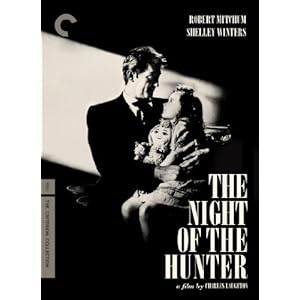
I have seen two movies featuring Shelley Winters recently, and they both involve men marrying her only because of ulterior motives. That doesn't mean anything, but there you go.
The Night of the Hunter was received poorly when it was released in the 50s and was actor Charles Laughton's only work as a director, which is unfortunate because he clearly was talented and film viewers in the 50s didn't know shit about shit. Hunter is a very creepy, effectively moody film, taking a lot from German expressionism and film noir to create its unique style. At the center of it is Robert Mitchum in a completely amazing performance as Harry Powell, a preacher with hate tattooed on the fingers of one hand and love on the other. He is able to charm normal people with his righteousness and friendliness, but the fact that he begins the story sharing a prison cell with a man condemned to hanging for double homicide should tell you all you need to know. The man hid $10000 with his two children, and after Harry is released, he pursues the man's widow (played by Winters) with the intention of finding it. He manages to win her and her daughter over for the most part, but John can see through him.
Eventually Winters catches on, and it's not long before the kids are on the run. They find an unlikely source of help, and it's not long before Powell's sins catch up with him. But along the way there's a hell of a lot of amazing imagery and creepy Mitchum to make it easily one of the best thrillers of the era. The sets will often change in ways that reflect the mood, sometimes subtly and sometimes not. The use of shadow is the most prominent and interesting, and there's also an underwater shot that is one of the most haunting I've ever seen. It's not a very nice movie, and I can sort of understand why audiences weren't ready for it yet... even if the German influence came from films made decades earlier. But it's one of those older movies that gets better as it ages, when some of the stuff it does loses its sheen of unbelievable shock and can be appreciated for the art behind them. I didn't care for how much of the story revolved around a couple kid actors, but they do well enough not to ruin a pretty damn good film.
Friday, January 28, 2011
The General

I mentioned a while ago after seeing my first Buster Keaton movie that I liked him more than the more famous Charlie Chaplin. At the time I hadn't seen what I consider better films by Chaplin, but after watching The General I remain convinced that Keaton is more my style. His movies don't have the emotional depth of Chaplin's, but he's just a funnier presence on the screen, and that matters more when I'm watching a silent movie with about a dozen title cards worth of plot. The General is quite a bit longer than Sherlock Jr, and while that means it isn't quite as uniquely brilliant at every single moment, it's still a very funny movie with a decent little story of love and war to boot.
It speaks to Keaton's ability as an entertainer that I was only bothered for a few minutes by the fact that I was being asked to root for a Southern man as he tries to disrupt the Yankee war machine during the Civil War. But you could flip the roles and the movie really wouldn't be very different; the plot consists of Keaton being refused for recruitment based on his usefulness as a train engineer, orchestrating a daring rescue of his beloved girlfriend on the fly after she is accidentally kidnapped by Union troops, and then racing back to try to warn his side of a surprise attack. It's a simple story, and it really just serves to set up the action. I was actually a bit annoyed by some of the drama they tried to insert early on, because it's the sort of simple misunderstanding blown out of proportion that would be easily solved if people just talked to each other. But it's a small speed bump.
And yeah, the meat of the movie is pretty great. Most of the action is centered around a couple of scenes taking place on train tracks, with Keaton chasing after the bad guys or vice versa. There's a lot of creativity in some of the gags, although it's tempered somewhat when many are repeated later with only slightly different methods or tweaks. Part of what I prefer about Keaton over Chaplin is his physical ability, obviously Chaplin has pretty great skill there, but Keaton is just all over the place, jumping from train car to train car and pulling off daring stunts. His work is as much an extremely early example of action as it is comedy. And then there's the face. Plenty of actors can don goofy expressions all day long, but I can't think of anyone who can do so much with a simple blank stare. I don't think anyone's ever gotten more laughter out of a confused, emotionless gaze. Certainly one of my favorite comedies of the silent era.
Thursday, January 27, 2011
Justified - Season 1
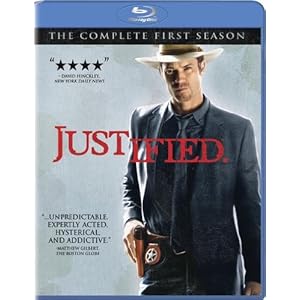
The only reason I didn't watch Justified when it premiered early last year was that I wanted to see Walton Goggins' acclaimed work there before moving on to the new show he was in. Sort of silly, but I'm glad I did in anyway so my impressions of Shane remained uncolored. The DVD came out in time to catch up before season two begins in a couple weeks, so there's nothing really lost anyway. Justified is a hybrid of police procedurals and serialized drama, set in the deep South of Kentucky and starring Timothy Olyphant as author Elmore Leonard's Raylan Givens, an old-fashioned lawman living in a modern age. The style is sort of a mix of elements from westerns and detective novels, with Givens having both the keen wit and lightning trigger finger necessary to work as the protagonist of either. He doesn't quite fit in to today's world, shown in the premiere when he's shipped from Miami back to his hometown after he kills a man in broad daylight, and put on the low end of the totem pole in the Marshall's office. There's something dark hidden under his cool exterior, and the first season does a good job of exploring that a bit while leaving some mystery intact, and establishing him as one of the most interesting and entertaining protagonists on TV.
There's more to the show than just him though, as he has to deal with his estranged father, the criminal network and family of old friend Boyd played by Goggins, and a multitude of other issues that arise from week to week. The show juggles stand-alone cases with the more long-term elements pretty deftly, especially as the season goes on and the two become more integrated. Only the premiere and maybe the last three episodes don't have any elements unrelated to the central story, but you hardly notice one way or the other just because the weekly stuff is so generally strong. Not every one is a grand mystery, but even the most obvious ones are amazingly enjoyable thanks to near-universally great writing and casting, and when things tie back into larger goings-on it feels like a bonus rather than a relief. The dialogue is sharp, the whole cast is interesting enough with Olyphant and Goggins at the center, and the violence is remarkably bloody and well-filmed for a cable show.
Really, there's not much about the show not to like. Maybe if it was more focused on a story and the main characters rather than having fun with a bunch of different one-offs, it could have pulled off something even greater in the end. But even with the divided attention, they managed to complete a really entertaining and satisfying arc through these first thirteen episodes, basically having their cake and eating it too. There's enough left open to keep the possibilities of the next season exciting, especially with some of the choices a couple characters make by the end, and it's just a well-produced, funny show that you can check out once in a while or watch every week. It makes you wonder why networks can't get this stuff right - so often you either get a serialized show that doesn't go anywhere or an episodic one with highly fluctuating levels of quality from one episode to the next, and Justified handles both aspects with ease. I guess it just comes down to the quality of the source material, the writing, and the casting - Justified is filled to the brim with talented character actors who just aren't famous enough to be on movie posters. It's not perfect, but it's as solid as shows with its somewhat modest aspirations can get.
Wednesday, January 26, 2011
Wild Strawberries
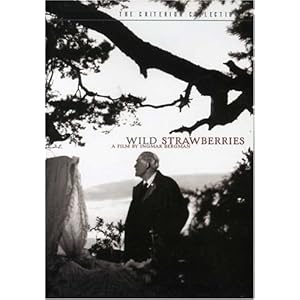
Ingmar Bergman's most famous film is The Seventh Seal, perhaps almost entirely because of the chess game with Death scenes. But he actually had another movie that was released the same year, and it turns out I actually preferred it. Wild Strawberries deals similarly with questions of mortality and (to a lesser extent) religion, although it is contemporary rather than set during the crusades. It's about an elderly doctor who is returning to his old university to receive an honorary degree. He decides at the last minute to drive to the ceremony, and the film is about his journey, through life as well as to Lund University. There are frequent dream sequences, sometimes mysterious and filled with strange imagery but more commonly just memories of things he did or didn't actually see, that show how events brought him to the depressing situation they're in now.
He hasn't had the most fulfilling life, a long-time widower with only his ancient mother and a single child following his same path of coldness and introversion as living relatives. He is accompanied on the car ride by his daughter-in-law and a few teenagers, one of whom reminds him of a girl he used to be in love with but who ended up marrying his brother (and is actually played by the same actress, which I failed to notice), and their influence along with his reflections cause him to reevaluate how he thinks about life over time. As I mentioned, the themes are often similar to those in Seal, but Strawberries worked better for me because it was more about showing things that lead the revelations than people talking about their beliefs. The two biggest characters from that movie also show up in small parts here, but Victor Sjöström does very well in the lead role to keep the audience's attention, in his final performance, and gives the movie a weight it couldn't survive without.
It seems like life and death were always things that Bergman was thinking about, and it's pretty remarkable what a grasp he seems to have on the truth about being old when he was just in his 30s. It's one thing to understand and appreciate a powerful story like this, but actually telling it so well is something else. The use of unique images is impressive without overpowering the message, and it's just a remarkable story that manages to cover really hard topics without getting too depressing, and actually managing to come around to uplifting by the end. It's a bittersweet movie, but that makes it all the more interesting and likely to stick with you after it ends.
Tuesday, January 25, 2011
All About Eve

All About Eve, winner of the Oscar for Best Picture and recipient of 80 million acting nominations, is one of those great Hollywood movies about Hollywood. Well, actually, it's more about Broadway than Hollywood. But if you replace the dialogue about staging with dialogue about filming you can hardly tell the difference, and enough of the characters spend time in Hollywood anyway. It's sort of like Sunset Boulevard, which came out the same year, in reverse. One of the main characters is an aging star, though in Boulevard she psychotically draws a young writer into her web while in this film she's the target of obsession by a younger actress. The film opens with an acting award being presented to a girl named Eve Harrington, while a few in the audience don't look too happy to see her win. The story then jumps back in time to show how they got to this point. I wonder how much different the story would have been if they didn't reveal that Eve really wanted to be an actress right in the opening, but she presents herself as merely a big fan of Margo Channing, the previously mentioned aging star, and is introduced to her backstage by a friend. Eve ingratiates herself with their circle, but over time it becomes clear that she's not just the dedicated admirer she presents herself as.
There's some twists and turns as we learn how about Eve is genuine and how much she's really planning ahead to get to whatever her goal is. The script is really excellent telling a story that could have come off silly in a great way, and the dialogue is top notch. The back and forth and drama between characters is just great, and the use of multiple perspectives for the narration gives it something extra. The cast is great as well, with more outstanding characters than most movies can reasonably support in the time allotted. The most famous person in the whole movie though is a young Marilyn Monroe, who shows up for one scene to be a young Marilyn Monroe. There's usually something new going on, although I have to admit feeling the movie ended dragging a bit until the fairly brilliant ending. There's not much else to say about the film really, I can't compare anything to any work by anyone involved and it's basically just a well made, entertaining movie. The one thing that didn't work was when they used rear projection or something to film an outdoor walking scene and it looks unbelievably terrible. Like, the background is shaking and the characters aren't, and they are visibly walking in place. Otherwise, it's totally watchable today.
Monday, January 24, 2011
The Omen

It seems like a lot of the most famous horror films from 40-50 years ago dealt heavily with Christian themes in their stories, while more recently they have worked with whatever they feel like making up. You still see your share of possession movies and stuff like that, but I think we're less focused on the religious stuff in general. It doesn't make a big difference in any case. The Omen seems to owe a lot to The Exorcist, involving a parent dealing with the possibility that the devil is involved with their child in some way. I thought it was slightly more effective as horror, although not to the point where I would exactly call it scary either. There are a few pretty suspenseful scenes, but the movie's most dramatically scary moments are either too famous to be shocking now or just funny seeing them in 2011. Still, the film has its creepy bits and still works as a decent story the same way that The Exorcist did.
Gregory Peck is looking pretty old, playing the new US Ambassador to England. He moves to a nice mansion with his wife and son Damien, but things take a strange turn when the kid's nanny publicly commits suicide after getting stared down by a dog. The movie slowly ratchets up the mystery while more and more strange things start happening around Damien, at the same time that a priest warns Peck of the danger his son represents and a photographer notices some curiosities of his own. The kid who plays Damien is well-suited for the role, able to come off as creepy without trying too hard and selling the idea of what appears to be a normal child that happens to have the blood of Satan in him. Unfortunately they don't quite use him to his potential, as a lot of running time is spent on the admittedly somewhat intriguing questions around his birth and how can be stopped rather than really selling him as the embodiment of evil born on Earth. It won't frighten modern audiences the way some other stuff will, but it seems like it will hold up as a watchable movie a lot longer than many of those. At the very least, it still works enough now to make the remake from a few years ago look totally unnecessary, even though I haven't seen it. Pretty good original score, too.
Sunday, January 23, 2011
Assassin's Creed: Brotherhood
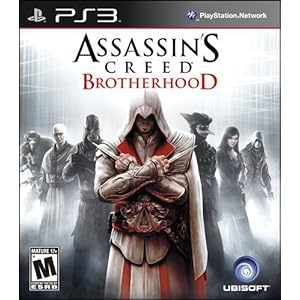
I was a bit surprised by the two year gap between the original Assassin's Creed and the second game when so many franchises these days focus on the yearly schedule, but it didn't take too long for Ubisoft to decide to annualize it. While II jumped the series forward in time a few hundred years (for the bulk of the gameplay, anyway) and used a new main character, Brotherhood is a direct continuation of that character's story, with the added hook of a significant team-building element in the single player and a multiplayer component as well. So in some ways it feels like a secondary game just meant to make some money and remind people that the franchise still exists before the "real" next one comes out, but there are enough developments to the overarching plot and additions to the standard gameplay that it's definitely deserves to stand beside the other games as a legitimate sequel.
So Brotherhood starts shortly after ACII ended, both in Ezio's time and in Desmond's. I thought the game might take place entirely in the past since Desmond already got what he needed from Ezio's memories, but it turns out there's still more he and the team need to figure out, so it's back into the Animus he goes. They hide from the bad guys and he learns more about the history of his ancestor. Due to predictable circumstances Ezio doesn't lose all his ability but most of his equipment is gone, forcing him to rebuild his arsenal as he relocates to Rome. We got a small taste of that famous city at the end of the last game, but Brotherhood lets you explore it fully, and it's the biggest single location in the series. The scale of the games seems to have curiously shrunk over time, with the first featuring three famous cities and the connecting areas, the second including two major locations and a few smaller ones, and Brotherhood having only the one significant location. But it's varied and big enough for the game's purposes, plus there's plenty of opportunities to revisit old locations for a bit.
The progression is similar to ACII for a while, as you discover the plans of the enemy (this time the whole Borgia family) and make some of your own to eliminate their influence over the city. Ezio's more ambitious this time though, aiming to completely remove the Templars from the city by buying out businesses and eliminating anyone of importance who stands against him, and most significantly, taking over the Assassin's brotherhood and building his own army of recruits. These systems add a lot to the feel of the game without being too distracting, as it's just a few minutes of navigating menus to maintain your affairs and the recruits come with the benefit of being able to help you out in battle as needed. All of these ideas are actually pretty simple in execution when you really look at them, but they're robust and interesting enough to make an action game like Brotherhood seem more important than one man's quest for revenge.
They do a surprising amount on Desmond's side too, letting you see a few familiar areas in a new light, bringing back ideas like snooping through emails, showing you how his assassin training is really progressing, and ending on a cliffhanger that left me both surprised and anxious to see what happens next. In addition to the required stuff, the optional content seems more considered this time. The secret puzzles left by subject 16 are back, but in addition to that you can do things like unearth some repressed, sad memories from Ezio's past and do some extra assassinations a bit more complicated than the ones in the last game. And of course there's the online, which doesn't seem to have the biggest PSN community but was pretty fun in the little of it I managed to play. You choose a character and try to track down another player while the same is being done to you, and the constant cat-and-mouse assassinating and balance between blending in and knowing when to use your flashier skills are cool enough that you don't really care who wins, just because it's interesting to screw around with.
There's not a whole lot new with the audio or video, with the voice cast and familiar soundtrack returning and not too many graphical enhancements. It's nice that you can get from one end of Rome to the other without loading, and they at least managed to fix most of the faces, making Kristen Bell's Lucy no longer resemble a human-fish hybrid. There's nothing too exciting about Ezio's story for the most part, and unfortunately the reason for most of the conflict in the whole game is pretty poor. Despite the crazy conspiracy plot, the team has been pretty faithful about honoring what the historical figures they play with were generally doing at various points and when they actually died, but the justifications for certain things seemed flimsy when a bit of tweaking would have made it all make sense. There's no reason Ezio wouldn't have killed some of these guys when he had the chance, so having him randomly decide not to rather than creating a situation where he couldn't just seems lazy. But otherwise I still enjoy what they do with the story, and the modern stuff in particular was pretty good. They do a good job of making all of the characters likable this time, and that aforementioned ending is memorable and actually a pretty significant bummer. I wasn't expecting the story to affect me the way it did, and I guess that's worth noting. There should be another game later this year, and whatever time period it takes place in, I'll probably be enjoying it.
Wednesday, January 19, 2011
Who's That Knocking at My Door
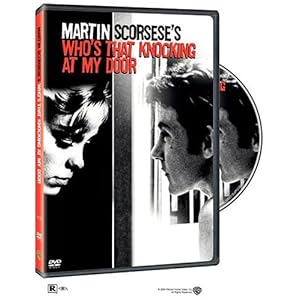
Who's That Knocking is Martin Scorsese's first film, and it has a pretty weird production history which helps explain its disjointed nature. It stars Harvey Keitel as J.R., a simple criminal in New York. He helps run vague operations with his friends, whom he spends a lot of time just screwing around with. This part of the movie was filmed as a student project before Scorsese graduated. Then he came up with the idea for the story of a relationship where the man eventually learns an awful truth about the woman's past, and is unable to cope with it properly. He filmed this and slapped it together with the hanging-with-buddies stuff, and the two plot threads never meet. It was released at festivals as I Call First. Then he got a deal for distribution, on the condition that he had a big sex scene they could use to help sell it. He filmed the scene and added it in, the name was changed, and that's the movie I watched.
If it sounds like it would all add up to a slightly odd and befuddling film experience, it kind of does, although I still liked a lot of the individual scenes and a lot of the way it was all filmed. It has a lot of style that you don't really see from movies back then, with scenes at different points in time being intercut interestingly and some unique and creative choices for angles and stuff like that. It makes the whole story more engaging to watch, even if there's very little in the way of a continuous plot or true character development. The two stories aren't completely shut off from each other, because the scenes with Keitel and his friends hint at something that's bothering him, specifically involving a girl, and it ties the ideas together without them specifically referring to each other. And while the sex scene is definitely unnecessary, Scorsese still found a way to tie it back into an existing scene, and the way it was done, with some of the film's best cinematography and a sort of weird symbolic feel to it, makes it feel less totally superfluous.
And while it might have worked better on its own as a short film or expanded into something more, the stuff with Keitel and Zina Bethune is really pretty strong. Their relationship seems natural, both in how it blossoms into something meaningful and how it falls apart when Keitel reveals the massive flaws and insecurities in his personality. It could have easily been boring or hard to watch, but I mostly liked it, and as his first film, it's a decent showcase of Scorsese's ability to shoot scenes in new and intelligent ways. I only watched it because it was expiring from Netflix Instant, but I don't regret it at all.
Tuesday, January 18, 2011
Nights of Cabiria

Nights of Cabiria is a pretty good movie with a great ending. The conclusion didn't quite get me to love a movie that I wasn't crazy about the rest of the time, but it did solidify my opinion that it was more interesting than 8 1/2, the first film by Federico Fellini that I saw. It stars his wife Giulietta Masina as Cabiria, a prostitute who works the streets of Rome and has trouble discerning the real intentions of men who try to court her outside of her job. She won a number of awards for her performance, and it's a memorable one, although I think it's a bit too silly to truly be great. The movie tries to be both a comedy and a drama, and I didn't think the combination meshed as well as it could have. Generally I'm just a little put off by some of the things Fellini does, leaving him as one of the great directors whose work I seem to identify with the least. His trend of dubbing all the dialogue in the movie is distracting, and it seems like all of the characters are always shouting in those Italian accents which can just get abrasive.
But I guess it speaks to his skill that these annoyances don't overshadow the fact that it's still a good film at its core. Most of the actors do good jobs despite all the shouting, and it's a really nice looking movie. It almost feels modern with some of the choices in composition that just weren't very common in the Hollywood of the time, and they serve the simple story well. I think it's supposed to be in the neo-realist style that was so popular in post-war Italy, and while some of the more silly comedic bits don't really help sell that, the simple plotting and dark turn that things take definitely fit the description. I guess I should bring this back to that ending. You can usually tell when something bad is going to happen in a story even though the events going on at the time are totally happy, just by what's happening at the time. If it seems like they should have said "and they lived happily ever after" a couple minutes ago, then they probably won't. The way the tension builds as you wait for the other shoe to drop as Nights of Cabiria comes to a close is incredible well done, and it's pretty devastating when it finally does. Maybe not as harsh as The Bicycle Thief, but it's a great sequence, and then Fellini eases the suffering just a bit with a simple and elegant denouement that doesn't whitewash what happened but still makes life seem just a little better. I only wish that more of the preceding hour and forty minutes could have been as powerful.
Monday, January 17, 2011
The Treasure of the Sierra Madre

What's interesting to me about this film was how much it surprised me with Humphrey Bogart's character. I thought it would be a fairly standard if well made old fashioned adventure movie, with him and a couple other guys seeking gold in a foreign land. Early scenes had a bit of an edge, as he and another man who were swindled out of proper pay for some work they did beat the cash out of the guy who cheated them. But he still seemed like his usual self with the rough charm and everything, and as the plot really got going, I saw no reason to change my mind. But very slowly, the movie reveals how much of a dick he really is under that likable exterior, and after a while, he's basically playing the villain. The pacing of the transition is really great, as he gradually transforms from a guy eager to make a fortune, to one a little too defensive of the money he's made, to a completely delusional, paranoid and basically crazy son of a bitch. His companions see the warning signs but aren't quite prepared for what he ends up doing, and the movie ends up a lot darker than what I thought I was going to see.
And it's a better film for it, I think. I was certainly enjoying it up to the point where things start changing, with the three main actors developing an interesting little community together and a script totally rife with snappy dialogue. It's known for one of the most famous misquoted lines in history involving stinking badges, but there's a whole lot of talking the whole movie through, and there's no shortage of nice bits. I also liked how the Spanish dialogue wasn't subtitled at all, either letting characters translate it for their monolingual cohorts or just making you figure out what's happening in a scene through action and context. I'd generally expect movies from this era to just have Mexican characters always speaking English, and it really helped add to the authenticity of a fairly gritty tale. The acting is solid, and although I wasn't sure about Walter Huston winning an Oscar for his work, there's something really likable about the old guy. And all of that would have made for a solid movie, but the way things turn bad as it goes on are what really make it the classic it's considered today. It's not quite one of my favorites of the era, but it's hard to deny that it's a really good one.
Sunday, January 16, 2011
Undeclared

Undeclared is sort of a companion piece to Freaks and Geeks; a Judd Apatow-produced TV series, taking place in college instead of high school, that was canceled after just one season. And it's pretty good, though not quite the classic that I've seen some people describe it is. Just like Geeks, I actually saw several episodes back when it was airing, but it's just now that I've managed to see the whole thing. It's generally enjoyable, and the cast is surprisingly recognizable and likable. Neither of the women are very prevalent today, though they can both be seen here or there, and obviously Apatow staples Seth Rogen and Jay Baruchel are there. The most surprising thing though was seeing Charlie Hunnam as pretty-boy womanizer Lloyd, speaking in his native English accent. I'm not sure how he ended at up going to a less-than-prestigious school in northern California, but it makes it even funnier that he's so close to the location for his current role as the protagonist of Sons of Anarchy. He's amazingly different considering the shows aired only six years apart, although some of his tough guy ability does shine through, especially in the episode where he teaches Baruchel's Steven how to fight like a Brit.
For a show about college, there's hardly any school stuff involved. There are a couple scenes with one of the guys in class, and a plot where a few characters pay Will Ferrell to write papers for them, but otherwise the show is all about the parts of college that everybody likes remembering; hanging out with friends at the dorm, and some of the weirder stuff that can come out of that. It's really a show all about how relationships develop, romantic or otherwise, and the setting is just a good place for that to happen since everybody is a stranger and eager to meet new people. The focus is mostly on Steven and his uneasy courtship with Lizzie, but everyone gets an opportunity to do something. There's also some stuff with Steven's dad, who spends a lot more time around Steve than he expected after he separates from his mom, which provides a few laughs as well as some perspective on the whole thing.
But yeah... it's not as good as Geeks, nor as funny as any of the real greatest comedies of the last decade. I think a big part of it is that the Apatow style of comedy just doesn't translate well from R rated movies to network television, and the writers weren't quite good enough to overcome that. It's hard to take things seriously when college students refer to someone getting denied from hooking up at a party as "crotchblocking". There are some pretty brilliant moments, especially when Lizzie's weird, jealous boyfriend played by Jason Segel gets involved, but for the most part I really wasn't laughing that much. It's a show with a strong enough foundation that I wished there could have been more of it, but it's no real great loss, especially with the success most of the people involved have seen since it ended. Nice show, not my favorite.
Saturday, January 15, 2011
Andrei Rublev

After how taxing Stalker was, I was worried about how difficult Andrei Tarkovsky's historical opus Andrei Rublev would be to get through, being nearly an hour longer. Luckily, it was relatively easy to watch, considering the obscure subject matter and expansive running time. The trade-off is that it wasn't nearly as gripping, but you take what you can get. The film is about the titular Russian painter, who worked mostly in icons and lived during a turbulent period in his country's history. Despite taking place six hundred years ago, the subject matter was apparently still pretty touchy for the Russian government, as the film wasn't available in its full uncut form for years after it came out in the 60s. From what I've read the movie is more accurate when it comes to the historical content than the actual life of its central figure, and while it's easy to stop paying attention while watching it, if you focus there's some pretty interesting stuff there.
The movie is chopped up into a bunch of segments showing various periods in Rublev's life, making it feel more like a quick miniseries than a long movie, which helps make it as easy to watch as it is. A lot of time is spent with Andrei discussing philosophy and life with people he comes across, but what was most notable to me about the film is its more controversial content. I may just be forgetting something here, but it's the earliest real film I can think of featuring nudity (and not just a little bit of it), and it's also pretty violent in areas, including an infamous scene that required the actual death of a horse to film. As shallow as it might seem, it helps keep a movie that otherwise seems a bit aware of its own importance interesting. I appreciate the scale and skill behind the accomplishment, I just wasn't nearly as intrigued by it as I was by the Tarkovsky movie I just watched. One of those movies I'm glad to be able to say I've seen, but that I'm not exactly ready to watch again soon.
Friday, January 14, 2011
Characters of 2010
People seemed to like my list of my favorite characters of the decade last year, so I thought it would be fun to keep it going with the best ones from 2010. Obviously, I don't have the perspective on these people that I did for most of the ones on the decade list, so I can't say for sure how many of them will really stand the test of time. All I can say is that these are the figures that had me most glued to the screen when they were involved, and when it comes to the ones that are still parts of ongoing series, I can't wait to see more of them. Again, these are in chronological order of their first appearance this year. And again, these are all men... but I blame this more on the number of strong female characters in male-focused entertainment than myself.
Abed Nadir
Danny Pudi - Community

"That's sort of my gimmick, but we did lean on that pretty hard last week. I can lay low for an episode."
Abed established himself early as Community's most entertaining character, although it wasn't until this year that I was sure it was more than just a gimmick. He sees himself as a supporting character on a TV show rather than a student at a community college, and while on one hand it makes him a strange and troubled man, on the other it makes him the only character who really knows what's going on. The way they play with that side of him provides some of the show's best comedic moments, but while he has some personality issues, he also has helped provide some of the series' best emotional content to date. The show would still be great without him, but it wouldn't be the same.
Harry S. Plinkett
Mike Stoklasa - RedLetterMedia

"Star Wars Episode II: Attack of the Clones is the worst thing ever made by a human."
Like Abed, the Plinkett character was created before 2010, and first came into the public eye near the end of 2009 with his review of the first Star Wars prequel. But 2010 was really the year of Plinkett, as he came out with new looks at the other prequels, Avatar, Star Trek, and even Baby's Day Out, establishing himself as the preeminent humorous pop culture critic on the Internet. The content of the reviews themselves are always great, but it's the addition of Plinkett's weird homicidal tendencies and unique way of phrasing things that puts them over the top.
The Eleventh Doctor
Matt Smith - Doctor Who

"Bow ties are cool."
I wondered how well the youngest Doctor ever would fit the role so well handled by David Tennant for the last four years, but I was sold by the end of his first scene in the season premiere. Smith's Doctor has a bit more range than the other two since the show came back, perhaps the wackiest version yet but also possessing a certain angry conviction when it's called for. He helped prop up a season that was solid but lacked any truly transcendent episodes.
Creighton Bernette
John Goodman - Treme

"This is Creighton Bernette from New Orleans. Yeah, we're still here. I just want to say something to all y'all trying to figure out what to do about our city: blow me."
John Goodman was never officially a part of Treme's main cast, but his character was key to its first season. Creighton is something of a mouthpiece for the creators to speak their minds about how Katrina was handled, but it's easy to look past that with how entertaining the performance is. And on top of that, the end of his character arc helped provide a real sense of weight to the end of the season that it had mostly lacked. I think he was essential to my perception of the show being as positive as it was.
Big Daddy
Nicolas Cage - Kick-Ass

"Oh, child. You always knock me for a loop!"
Hit Girl got all the attention because it's so crazy to see a young girl swear and kill people, but I honestly found her father to be a much more interesting character. Nic Cage basically plays Big Daddy like Adam West played Batman, and while his career is starting to feel like some sort of Andy Kaufman-level genius joke, I really enjoyed his work in this movie. His one big action scene was probably the highlight of the movie for me, and his odd personality both with and without the secret identity was a lot of fun.
John Marston
Rob Wiethoff - Red Dead Redemption

"I left the gang after the gang left me."
Red Dead Redemption had my favorite story in a game this year, and its protagonist was a big reason why. John is a complicated man, with a generally good heart, but prone to a lot of poor decisions that put him and his family in a tough place. He's a killer, but he's also a family man who cares deeply about his wife and son. He's a guy you'd always want on your side if the guns ever came out. And his easy charisma when dealing with anyone new helped keep things interesting. He could also be a real son of a bitch if you wanted him to.
Kale Ingram
Arliss Howard - Rubicon
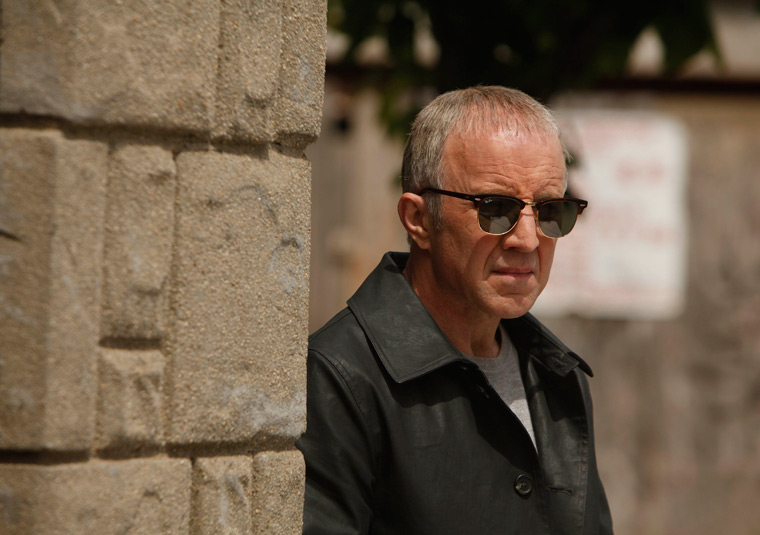
"The way you live is disgusting."
The villainous Truxton Spangler became the focus as Rubicon's only season came to a pretty solid end, but Kale was the guy who kept the show afloat when it was still trying to figure out what it wanted to be. Even to the end you never really knew what side he was on, but he was a big help to protagonist Will while he was trying to navigate the treacherous waters he found himself in. There's just a cold badassness to him that you wouldn't expect from a calm intelligence analyst. And the show played his homosexuality like it was just a simple part of his home life, which I liked.
Louie
Louis C.K. - Louie

"You don't like rape? You don't? That's really weird because you know that you wouldn't even exist if your mom hadn't raped that homeless Chinese guy."
It's hard to say where Louis C.K. the actor ends and where his character on his self titled TV show begins, and I'm not even sure if that's a distinction worth making. Either way, Louis is possibly the funniest stand-up comedian alive, who also happens to be really great at portraying the simple reality of being a middle aged, divorced father of two in New York. Plus the occasionally journeys into his youth or psyche are usually fascinating and informative.
Eames
Tom Hardy - Inception

"You mustn't be afraid to dream a little bigger, darling."
The whole cast of this movie was excellent, but I don't think there's much argument that Tom Hardy was the breakout star, playing the team's "forger", which mostly meant he disguised himself as other people to manipulate the target. He had an enjoyable humorous banter with all the other characters and Joseph Gordon Levitt's Arthur in particular, and was also possibly the best action hero, basically single-handedly keeping the team alive when they got deeper into the nesting dreams-within-dreams they found themselves in. Definitely looking forward to more of his work.
Sherlock Holmes
Benedict Cumberbatch - Sherlock

"I'm not a psychopath, I'm a highly functioning sociopath. Do your research."
I almost don't want to watch or read any of the period Holmes stuff now, because the writing and performance of this modern day Sherlock was so good that it just seems like canon now. There's something very off-putting about Cumberbatch's know-it-all-ness and dismissal of anyone intellectually inferior to him (read: everyone), but he's just flawed enough that you love him anyway. Really looking forward to seeing how they expand on this interpretation of the character.
Richard Harrow
Jack Huston - Boardwalk Empire

"And then they'll tell us if we're normal or not. They're interested in what's in our heads so next time, we'll fight better."
There are a lot of interesting figures on this show, both historical and otherwise. But none were as immediately interesting and disturbing as the war veteran-turned-gun for hire with half a face played by Jack Huston. He grunts a lot and talks with a gravelly voice, and you hang on every word because you know he'll only say them if there's a good reason. We only got a few scenes with him in season one, but he figures to play a bigger part in 2011.
Rooster Cogburn
Jeff Bridges - True Grit

"I do not know this man."
I reject Cogburn as the film's main character, but not as its most fascinating one. It's again a mix of writing and performance, as the Coens used the novel to create a unique take on the grizzled old lawman archetype and Bridges breathed full life into it. Rooster drinks too much and he doesn't always follow the law exactly and he's probably killed more than a few men in cold blood. But he's still a force for good at his core, and what he goes through to see Mattie's job through the end is above and beyond the call of duty. An appropriate hero for a somewhat atypical western.
Thursday, January 13, 2011
Best Shows of 2010
While the last three lists were compromised by not being able to pay for stuff, this one was actually probably enhanced - there's a lot of time to sit around watching television when you don't have a job. The last couple of years for TV have seemed a bit dry in comparison to what we had before that, but 2010 was another one for the ages. There were are a couple shows that I unfortunately had to cut to trim this list to ten, although a few will get recognized tomorrow. But these shows in particular entertained me an amazing amount this year. Remember, this is recognizing these shows for the seasons which ended in 2010.
Best of 2010
10. The Venture Bros. (Adult Swim)

The Venture Bros. fourth season was its biggest ever, and while maybe not the best, it was still pretty excellent. After some felt the third season strayed too far into building up its own world and just wasn't funny enough, the fourth struck a nice balance between comedy and mythology, developing further one of the most interesting and detailed science fiction universes to come around in a long time. It's a cartoon so consistently well-written and presented that almost every new episodes feels like it could be a contender for the best one ever, although the hour-long finale had the best case of all.
9. The Pacific (HBO)

Major Dick Winters, former leader of Easy Company and the man Band of Brothers spent the most time focusing on, died last week. Not only was he a great man, but he provided a central character around which possibly the best miniseries ever could build. The Pacific lacked that sort of central figure that the whole thing could be tied back to, but it still managed to match and even exceed its spiritual predecessor in some areas, from the scale and intensity of the battles to the harrowing way the horrors of war are portrayed. It wasn't as great as Brothers, but that's quite a lofty goal, and it was still quite good for most of its run.
8. Sons of Anarchy (FX)

This is the most inconsistent show on the list this year, with a tendency to occasionally go too far with some of its plot threads and have its characters make questionable decisions. But besides #1, it was also the best show at producing exceptional individual moments that make all the hiccups seem totally worth it in the end. Sons of Anarchy's world is a tough place to live, and that's just as evident in this season as the first two, especially in the final episode, which had one of the best conclusions I've ever seen and really helped cement the show as one of my favorites. Best finale all year.
7. Parks and Recreation (NBC)

Parks and Recreation was definitely iffy in its brief first season, but the second was just about brilliant from beginning to end. It reminded people of what The Office was like when it was really cooking and not just the acceptable sitcom it is today, and in some ways it was even better. The central cast isn't as big, but in many respects it's stronger, and whatever wacky idea they were tackling, they just seemed to nail it every week. It's been away for way too long, and I can't wait for its return a week from today.
6. Lost (ABC)

Kind of a drop on this list compared to the last two years, but that's more due to the strength of the competition than anything Lost actually did wrong. Like the show's whole run, its final season wasn't perfect, but its strengths were great enough to overcome issues of unanswered questions or uneven pacing. We got some really great payoffs for all the best characters, and I personally thought the ending was perfectly fitting what they had built up. I'll miss seeing it this spring.
5. Community (NBC)

Technically I'm not including what the show has done so far in its sophomore season, although I will say it really helped cement Community as my favorite comedy currently running. The first was plenty excellent on its own, as it transitioned from a likable Joel McHale vehicle about community college into a stunningly brilliant ensemble comedy about anything and everything. The themed episodes get the most attention, but every week you're bound to see something you weren't expecting. The show is hilarious, but it also manages a lot of sentiment without ever seeming cloying. Just a great show.
4. Mad Men (AMC)
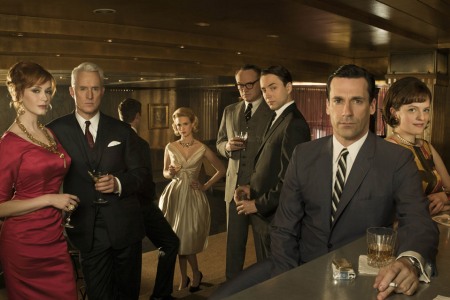
This was my favorite season of Mad Men, and it's slowly creeping up my list of the best stuff you can watch these days. It's not as careful and well considered as it used to be, but it's a lot more enjoyable, with a seemingly conscious effort to make the show quicker, funnier, and more dramatic. It was just a bit dry for me before, but I thought they struck a great balance between entertainment and intelligence this time. And yeah, that finale was pretty crazy. Looking forward to what's next.
3. Boardwalk Empire (HBO)

You could swap this and Mad Men and I'd probably hardly notice, but for now I'm taking Empire by a nose. I think some people find it a bit slow, and while I can tell why, I don't really care because I'm always glued to the screen regardless. The show looks great, it uses violence and sex effectively without seeming too trashy, and I love the way they slowly build up their own slightly fictionalized version of 1920 over the course of the season. It's not quite the powerhouse it might have been and still could be, but it's damn good just the same.
2. Dollhouse (FOX)

A lot of people probably forgot about this already, but Dollhouse's second and last season finished airing way back at the beginning of 2010, and so it goes on this list. Dollhouse had a lot of warts in its first year, but it still ended up as a pretty series by the end of the season, and while season two couldn't help but stumble a bit again, I thought it quickly rounded into the best thing Joss Whedon as been involved with since Firefly and one of the best pieces of science fiction TV period. They really did a lot with what little time they had, and I know for one I won't be forgetting about it for a while.
1. Breaking Bad (AMC)

After seeing the final season of The Shield, I decided it was actually better than Breaking Bad's first effort, which is why I can't really say Bad was my favorite thing on TV for three years in a row. But for a while there it was. They stepped up their game yet again in season three, which was both the show's most thrilling and funniest yet. You might be wondering how I could say Anarchy had the best finale all year after Bad's, but the truth is it honestly just felt like another good episode and solid cliffhanger after all the amazing stuff that came before. It seemed like every week they were topping themselves in terms of mind-blowing events that were going on, and they never let you catch your breath. We have to wait a bit longer than usual for season four, but I bet it will be worth it.
Wednesday, January 12, 2011
Best Albums of 2010
The music list always seems weakest when I do these, and I think it's because new albums are the first thing to fall off my frequent purchases when I'm low on cash. I just rarely go out and buy an album unless it's by an artist I already know. It's not that I don't think these are all really good albums, I just wish I had a lot more to pick between when putting this together. Because I do think these are all really good albums.
Best of 2010
5. Spoon - Transference
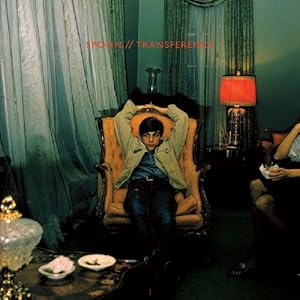
I enjoyed Transference about as much as Spoon's last release, though not quite for the same reasons. Ga Ga Ga Ga Ga had a lot of really tightly constructed, solid rock songs, while Transference is much looser and jammy. It was a slightly different approach to the same general sound that I liked a lot, and the whole album is just full of grooves that could easily last a lot longer than they already do. Maybe disappointing if you wanted more of the same, but I dug it.
4. Beach House - Teen Dream

I didn't review this because I got it after the new year, which means I won't since I don't do that anymore. But it's a really good album, making "dream pop" a lot more interesting than it sounds. It's really pleasant, well produced, surprisingly catchy music, and something a lot of different people could agree is nice to listen to. It kind of drags a bit by the end, but for the most part it's all really fun.
3. Gorillaz - Plastic Beach
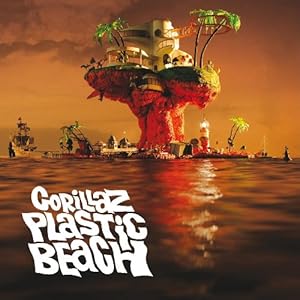
Plastic Beach didn't quite live up to Demon Days for me, but I liked it more than the Gorillaz' first album, which was also really good on its own. Maybe there could have been a bit more variety to the guests, but they're well integrated, Damon Albarn does a good job pulling double duty on vocals and production, and a lot of the songs hit just as hard as anything else they've done.
2. The National - High Violet
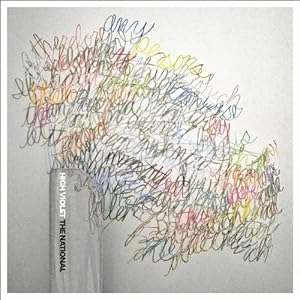
I have a feeling The National could become one of my favorite bands very quickly. The singer has an awesome baritone voice, and the songwriting matches it perfectly. I'm having a hard time trying to describe it, but it's just really well done, appropriately moody rock for a slightly more mature audience. Not every track is terribly interesting, but most of them are listenable on a nearly endless level.
1. Arcade Fire - The Suburbs
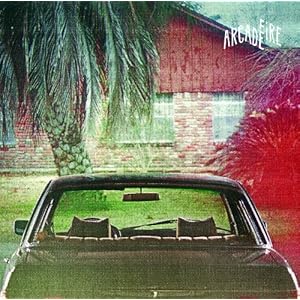
The Suburbs seemed like a nice mix between the first two albums by these guys, a bit more consistently fun and interesting than last time but also focusing on slightly more mature topics as they all grow into real adulthood. It doesn't have a single song that really matches the absolute best stuff they've done before, but "Sprawl II" is pretty much there, and almost everything else is at least likable enough that you don't really feel like skipping around. A true album from start to finish.
Tuesday, January 11, 2011
Best Movies of 2010
As far as prestige films go, I really didn't see anything this year. The Coen brothers' latest work would almost count, but it's actually probably their most accessible film since O Brother, Where Art Thou? a decade ago. But that's okay. I watch movies to be entertained, and I had plenty of fun with a number of mainstream releases this year, including a couple of the best blockbusters I've ever seen.
Best of 2010
7. Let Me In
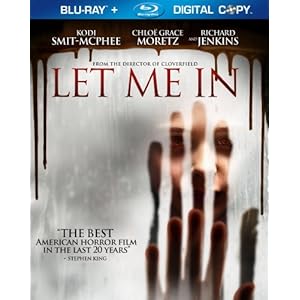
If I had never seen the film that this one is based on, I probably would have given it a lot more credit. As it is, it's still a more than competent remake of one of my favorite horror films ever, with at least a few things it does better or on its own that are almost as impressive. Some of the technical aspects are problematic, but what's important is that it's a well shot version of a creepy, interesting story.
6. Iron Man 2

Iron Man 2 isn't as good as its predecessor, but it's still one of the most enjoyable non-Batman comic book movies in a long time. The cast is absolutely overflowing with talent, and they all contribute to a really fun, comedic atmosphere that compliments the series' tendency to go for the bombastic when it comes to action scenes. Far from a subtly told tale, but it was a lot of fun for a couple hours.
5. Scott Pilgrim Vs. the World
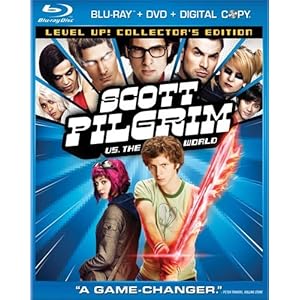
Few movies can match Edgar Wright's Scott Pilgrim in terms of just pure visual style and creativity, and he did a great job faithfully adapting the crazy setting and plot of the comic while massaging it to make sense in two hours. In addition to being very funny, it also had possibly the best action all year - well choreographed fights that you could actually see what's going on in. Another huge cast, and almost everyone fits their parts.
4. True Grit
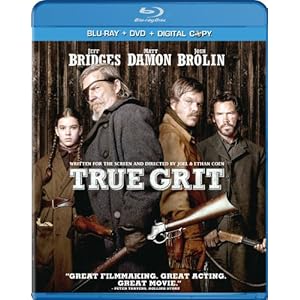
I guess it's not that surprising that this is now the Coens' biggest box office success ever, and it's nice to to see them make a film that audiences at large actually like. True Grit is not really one of my favorite films by them, but as a simple exercise in pure genre filmmaking, it works out really well. I'm not even sure if I want to see the first film based on the same work, lest it dilute my memories of what they did here.
3. Shutter Island

It wasn't that long ago that I despised Leonardo DiCaprio as a pretty boy actor, and here we are with this as only my second favorite movie he starred in this year. Martin Scorsese's creepy thriller wasn't his most nuanced work, but it was remarkably sure of itself and marvelous to look at, with some of the most purely haunting imagery I saw all last year. The ending managed to be effectively moving despite its predictably, and the care with which it was made elevates it above what it could have easily been.
2. Toy Story 3
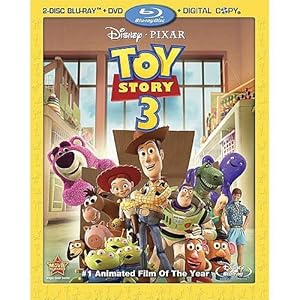
If I was a hack, I'd write something using the words "Pixar" and "'Nuff said", and then move on. But yeah, Pixar makes consistently excellent family-friendly (not kid-friendly) animated films, and this might be my favorite of them all. Hilarious, visually brilliant, and disarmingly emotional in places, it's impressive that they managed to not only meet the success of the first two movies over a decade later, but totally surpass them.
1. Inception
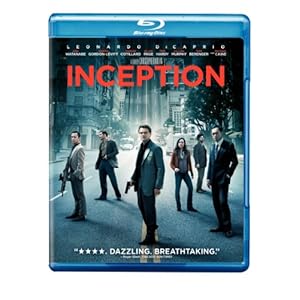
Probably my favorite action movie since The Matrix, and for many of the same reasons. The characters are well cast and likable, the story is heady and exciting to think about, the action itself is genuinely exciting, and it could turn out to be extremely important when it comes to effects in big movies. Whereas The Matrix sort of helped bring along a tidal wave of heavily computer-aided action movies, Christopher Nolan did as much of Inception as possible in camera, and it was all the more effective because of it. Hopefully filmmakers realize they can dazzle audiences without spending millions on animation, and put that money into things that our brains aren't all hardwired to immediately detect as fake these days. Hopefully.
Monday, January 10, 2011
Best Games of 2010
2010 was almost a lost year when it comes to these lists, because for about two thirds of it I didn't have much spending money to actually check out new stuff. I ended up with some lists I'm happy with though, even if I would have liked to have some more candidates available to get on. This list of games is pretty heavy on the first part of the year when I was actually getting paid, but it was a strong enough period that I'm comfortable saying these are all definitely worth playing.
Best of 2010
8. Shantae: Risky's Revenge (DSi)

The download-only sequel to the Game Boy Color cult hit seemed to get into a lot more hands, if only because it was on a system people were actually still using. The game's not perfect - I wish it had been just a tad meatier in terms of truly compelling stuff to do, but the dungeons that are there are fun, the platforming is solid, and the art and dialogue are completely charming. A fun, quick adventure.
7. Call of Duty: Black Ops (Multi)

I don't know if Call of Duty purists will ever allow Treyarch to think they made a game better than what Infinity Ward could do, but they managed their strongest effort to date with Black Ops. The campaign managed to avoid most of the series' traditional pitfalls and had an enjoyable if completely over the top story leading you from gun fight to gun fight. And judging by the fact that my brother is still playing the online almost nightly, I'd say they did a good job with that part as well.
6. Costume Quest (Multi)

Much like Shantae, Costume Quest is a game that could have probably used more content but was still pretty delightful while it lasted. The combat was simple but rewarding, and the adventure elements were clever without being obtuse. Add Double Fine's continuing excellence in the field of funny dialogue that actually amuses, and it's certainly worth a download.
5. Battlefield: Bad Company 2 (Multi)
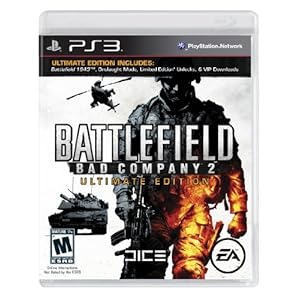
If this year was any indication, DICE is going to have a hard time ever making a game that really surpasses Call of Duty's stranglehold on the hardcore modern shooter market. But those who played it liked it a lot, both for the multiplayer which nicely translates the grand experience from the PC to a slightly smaller scale, and the campaign, which while a bit sloppy, is also in some ways a lot more interesting than the chain of scripted events that has come to define the genre.
4. Heavy Rain (PS3)
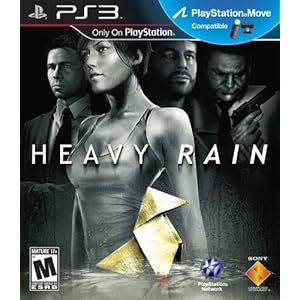
Heavy Rain is a very polarizing game, and for good reasons. If you don't like quick time events you'll never get into it, and the plot really goes off the rails by the end. But it's also amazingly well presented, the kind of thing that designers with respect for actual story structure could do a lot with. Heavy Rain provided some of the most tense and thrilling sequences I played through all year, and I didn't have to kill hundreds of people to do it. If nothing else, it's a very interesting game.
3. Darksiders (Multi)
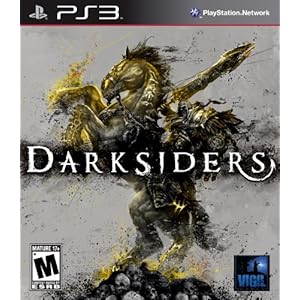
Darksiders is a game I wish we saw more of, something that came out of a true place of creative inspiration (even if it was a silly one) rather than a board room meeting trying to figure out what the kids are into these days, while still having the look and polish of a large budget title. The combat was imperfect but enjoyable, and the puzzle-filled dungeons were some of my favorites in a game in years. There, you see? You can write about Darksiders without mentioning Zelda.
2. God of War III (PS3)
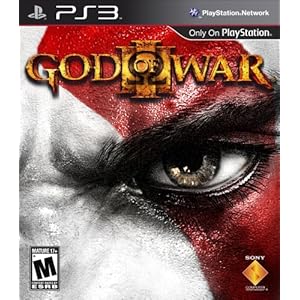
I was surprised to see a number of people recently express disappointment at how this game turned out. God of War has always been about pairing bloody, over-the-top hack and slash action with light puzzle solving and platforming in a pretty game engine, and this game's PS3-backed visuals and new twists on the old ideas meant that it did them better than ever before. What were they expecting? God of War III is awesome.
1. Red Dead Redemption (Multi)
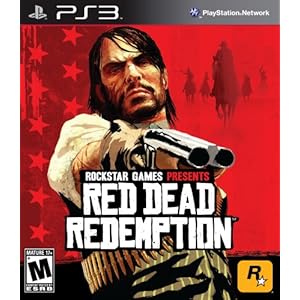
Grand Theft Auto IV was acclaimed upon its release but then seemed to leave a lot of bad will behind afterward, which is why it was impressive seeing how many people said that Red Dead made up for it. It has the best shooting in a Rockstar game to date, and the setting is one of their best realized as well. Add a truly likable protagonist at the center of maybe their best story, and Redemption has a real case as the company's best game ever. Add the best ending all year, and it's a heck of a product.
Notable Exception
Assassin's Creed: Brotherhood (Multi)
I started playing this last week, and while it sort of feels like just more of the second game, that game was also sort of awesome, so I'm having a pretty good time. I haven't played nearly enough of it to put it on the list, but the campaign's potential along with how interesting the multiplayer looks makes me pretty sure it would have made it if I had. I just hope they don't keep pumping these out and make it tiring.

































